Foundation Subjects
Geography and History
Geography and history form the basis of our curriculum themes, allowing for rich links between these subjects and other areas of the curriculum. All aspects of geography and history are taught as detailed in the National Curriculum.
Geography
The teaching of geography is designed to inspire a curiosity about the world and its people. Children will develop knowledge about diverse places, people, resources and natural and human environments as well as an understanding of the Earth’s physical and human processes. There are natural links between the geography curriculum and those of maths and science curriculums and many of the concepts taught are supported and reinforced through our teaching of these subjects.
EYFS
Geography in EYFS is taught through two strands: Mathematics and Understanding the World. Children are taught to understand position using words such as under, behind and in front of. They describe familiar routes and locations using this vocabulary. They describe their immediate environments and begin to identify similarities and differences between our country and others using knowledge from stories, non-fiction texts and maps. The children learn about materials in the natural world and begin to recognise the similarities and differences between the natural world around them and contrasting environments. They are exposed to simple maps and use these to gather information and begin to understand some of the processes around them, such as the seasons.
KS1
During KS1, the children continue to develop their knowledge of the world around them. They are exposed to more complex maps, including atlases, globes, aerial photographs and plan perspectives, and learn where the town, Uxbridge, is located within the UK. More complex vocabulary is introduced in KS1 with the children learning about human and physical features in the local area and further afield. Their knowledge of place and scale is developed by learning that the world is grouped into countries and continents and the ways that these are linked together by seas and oceans. Vocabulary to describe the position of places is further developed to include simple compass directions and directional language. Fieldwork is developed to ensure that there is a good understanding of our school and the local area. They use this knowledge to compare where we live with India.
KS2
In KS2, the children continue to develop their knowledge of the world on a larger and smaller scale. They learn about significant lines of latitude and longitude and whether countries are situated in the northern or southern Hemispheres. They develop an understanding of how lines of latitude and longitude affect day length, seasons and time zones. They compare human and physical features of London, a region in Italy, China, Mexico and Greece. This includes key physical aspects, including climate zones, biomes and vegetation belts, rivers, mountains, volcanoes, earthquakes and the water cycle, and human aspects, such as, types of settlement, land use, economic activity, and the distribution of resources. The children will be exposed to increasingly complex maps, including Ordnance Survey (OS) maps and Geographical Information Systems (GIS). These will be used to teach the 8 points of a compass and how to read four- and six-figure grid references. Fieldwork is used to observe, measure and record the human and physical features in the local area using a range of methods including making their own plans and digital technologies.
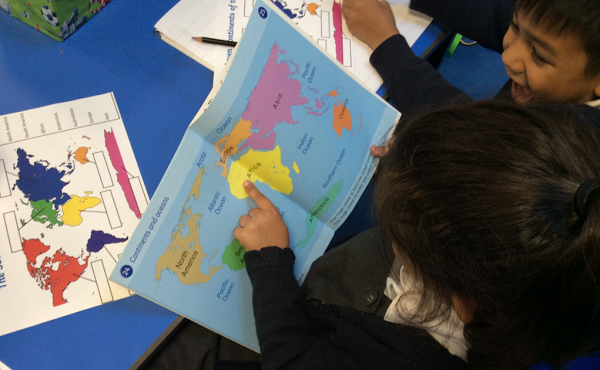
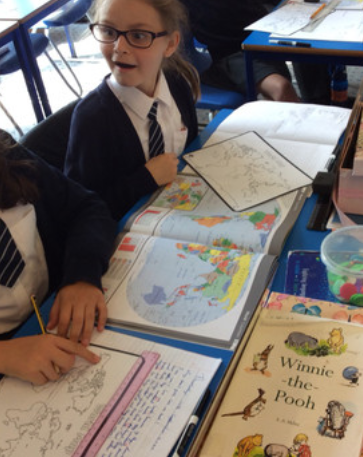
History
Through history lessons, pupils gain a coherent knowledge and understanding of Britain’s past and that of the wider world. The teaching of history is designed to inspire a curiosity and develop the ability to ask questions, think critically, analyse information and develop perspective. Children are taught to use sources of evidence to understand the concepts of significance, continuity and change, similarity and difference, and cause and consequence. All of this is supported by a developing understanding of chronology.
EYFS
In EYFS, history is taught through the strand Understanding the World. Children use their own experiences and books that have been read in class to learn about the lives of people around them and their roles in society, and identify similarities and differences between things in the past and now.
KS1
During KS1, pupils develop a knowledge of events that have happened within living memory (the past 100 years) and beyond living memory. They compare life now with life in different periods of time to identify changes that have occurred in national life, including how school life has changed and how the changes in flight technology have impacted the way we holiday. They learn about significant events in history as well as important people and their contribution to national and international achievements, including the importance of Queen Elizabeth I and Queen Victoria, and Florence Nightingale and Mary Seacole. They also learn about the importance of our school within the local area.
KS2
In KS2, the children begin to develop a greater knowledge of the chronology of history through study of local, British and world history, making links within and across the periods studied. The continue to develop an understanding of the key concepts within history as well as increasing their understanding of concepts such as empire, civilisation, society, kingdoms, monarchy, trade, invasion, migration and settlement. Each year the children learn about an aspect of British history and a period of world history. British history units are organised chronologically to help secure pupil understanding. The children also learn about changes in British history and how these have affected our lives, including the impact of Heathrow airport and the London Underground on our local area, and how our eating habits have changed since World War II. As well as learning about the impact of the Heathrow and the London Underground on our area, the children also study the famous architect who designed our affiliated church, George Gilbert Scott.
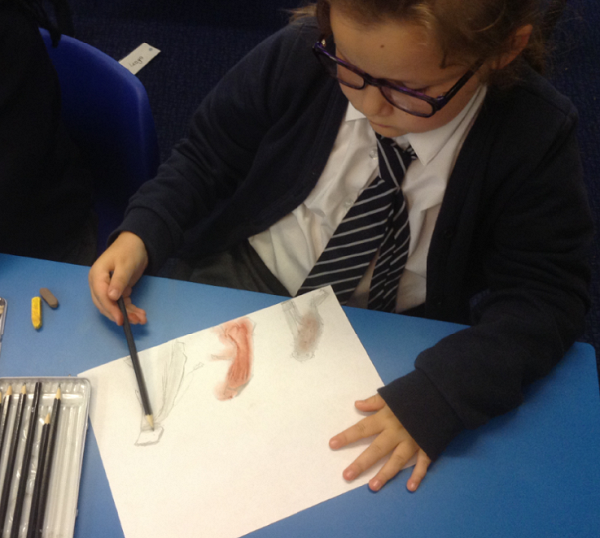
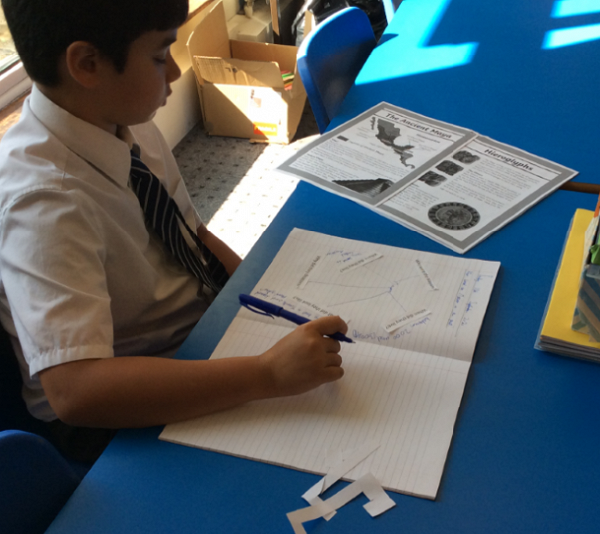
Design and Technology
At St Andrew’s CofE Primary, we believe in delivering Design and Technology education in a manner that ignites creativity and fosters imagination. We encourage our pupils to approach real-life problems by designing, creating, and evaluating products while considering the product, purpose, and the end user. Our objective is to inspire innovative and creative thinking, nurturing an appreciation for the product design cycle. This involves formulating design concepts, creating the product, and reflecting on its suitability.
Early Years Foundation Stage (EYFS)
Design and Technology in EYFS is incorporated primarily through the strands of Physical Development and Expressive Arts and Design within the EYFS Statutory Framework. During this stage, children are given opportunities to develop their fine motor skills, enabling them to proficiently, safely, and confidently use a variety of tools. They are also encouraged to freely explore a range of materials and find solutions to problems by building on their prior knowledge, refining ideas, and improving their ability to represent them. Collaboration is encouraged, with children sharing ideas, resources, and skills with others.
Key Stage 1 (KS1)
As children progress through KS1, they build on their existing skills and begin to think more critically about their material and design choices. They will consider a broader range of properties when making decisions during the design process, such as in Year 1 when choosing specific fruits for a fruit salad based on various criteria. The students will continue to enhance their use of tools and techniques to create finished models or products, while also considering their specific purpose. For instance, in Year 2, they undertake designing and creating freestanding playground equipment suitable for children of their own age.
Key Stage 2 (KS2)
In KS2, we offer our students the opportunity to research past and present designs and designers, understanding the influence these products have had on everyday life. When designing, children are prompted to express their ideas through diagrams, mock-ups, and prototypes. Furthermore, they gain technical knowledge in areas such as structures, mechanisms, textiles, and food technology. In addition, they develop skills in using a variety of tools including scissors, saws, and drills while considering accuracy and safety. There is also a strong emphasis on evaluating and testing their ideas and products to ensure they align with the initial design brief.
Ultimately, our aim is to cultivate an understanding of the impact of design and technology on our lives and to empower our children to become resourceful, enterprising citizens equipped with the skills to contribute to future design advancements.
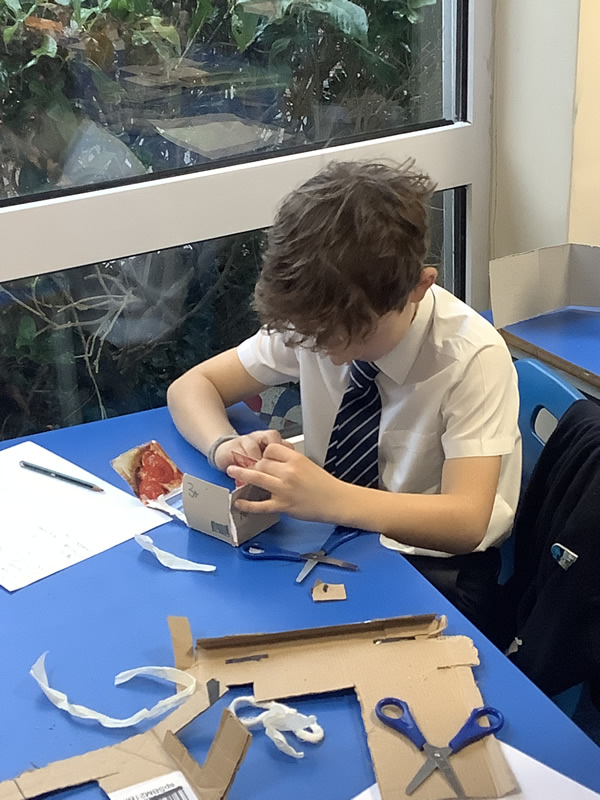
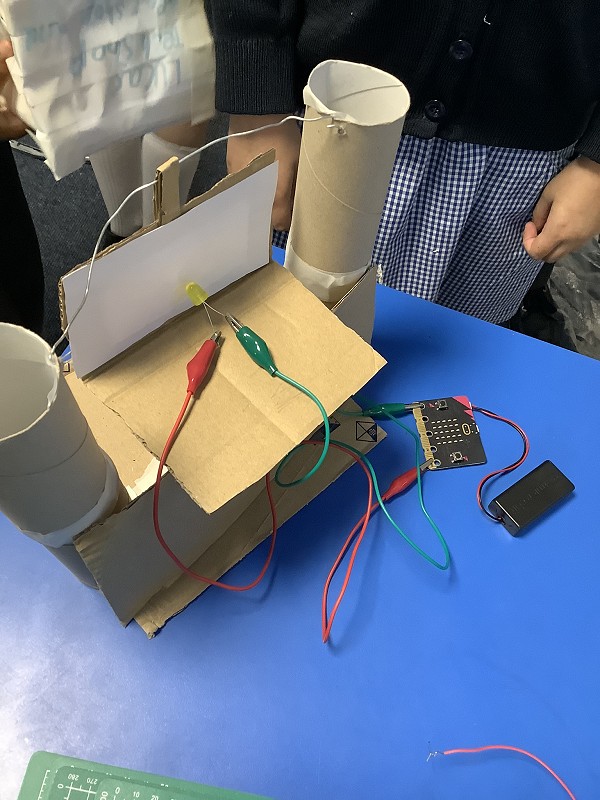
Art
At St Andrews we provide an Art curriculum that is exciting and designed for all pupils to enjoy their art learning journey. At St Andrews we strive to ensure that all children enjoy learning about artists, and progressing their skills in art. We know that some children can find art daunting as they progress in age and begin to compare their outcomes with others. We aim that children understand that art is a process and that the skills journey and progression that they undertake are just as important as a finished piece of artwork on a display. We develop the children into artists and refer to them as artists encouraging them to value their sketches, thoughts and ideas through the use of their sketch books. We feel that this is vital in the process of creating, experimenting and developing skills from Year 1 to Year 6. Throughout the year we focus on the strands of drawing, painting, collage and sculpture as well as other art and craft techniques.
Rationale for our sequence of teaching Art at St Andrews is based on building skills and revisiting these skills each year. Through revisiting, we aim to inspire artists to achieve mastery in skills. All schemes of work include one or more skill such as; drawing, painting, collage, sculpture or printing. Art is taught through a topic theme which allows many cross curricular links to be made throughout the year.
EYFS
In Early Years Art falls under the umbrella of Physical Development, Communication and Language and Expressive Arts and Design within the EYFS Statutory Framework. Children will develop their large muscle movements in Nursery and begin to use one handed tools and equipment. They will explore materials freely and begin to develop their ideas by mixing paints, drawing faces or representation of things they are familiar with. Reception children build upon this learning by learning to safely use a range of tools and techniques in order to produce their own creations. Children will use powder paints, water colours, crayons, loose parts in order to achieve an effect. Reception children will learn about great artists such as Matisse, Kandinsky and Van Gogh.
KS1
In KS1, artists will build upon their foundation stage skills and knowledge and begin to work in their sketch books where they explore and experiment with skills and techniques. Artists begin to develop and plan their ideas as well as respond to the work of other artists and crafts people. For example, in Year 1 children create clay leaf sculptures after learning about the artist Elizabeth Blackwell and in Year 2 they learn about Sally Brownes drawing and collage. Artists are taught how to use their sketch books as a reference tool to track their own progression using their own self-assessment and reflections.
KS2
In KS2 the progression of skills and knowledge of previous learning is paramount as artists continue to build upon this. Our artists continue to learn about great artists as well as learning about historical architects that have shaped and moulded our local area, such as the design of St Andrews Church by George Gilbert Scott. They will apply this learning as they create their own building design for the school using computer programming. Throughout KS2 the skills of drawing, painting, collage, sculpture and design are revisited numerous times allowing the artists to find their own individual style. They continue to build their artistic vocabulary and ability to self-assess and refine their own techniques through experimentation and observations. Our aim is to have children progress to KS3 as knowledgeable, confident independent artists.
Physical Education, School Sport and Physical Activity (PESSPA)
All pupils are entitled to a rich, broad and balanced curriculum and Physical Education (PE) is an integral element. Not only are we committed to providing high-quality PE lessons that cover a broad range of sports and skills to ensure that our pupils become more physically competent, but we also provide a wide range of additional activities through school sport - providing a wide range of sporting clubs, competitions, and physical activity - through a commitment to provide the government recommendation of 30 active minutes a day in school.
The benefits of PESSPA reach far beyond improved physical health, which is of vital importance, to include raised educational attainment, improved personal development and emotional well-being, better social skills, and development of leadership skills.
The importance of being active is further explained in the leaflet here.
EYFS
In Early Years, PE is taught through 3 areas of learning: Personal, Social and Emotional Development (PESD), Physical Development (PD) and Expressive Arts and Design (EAD).
In the strand PSED, pupils are taught to be confident to try new activities, showing independence, resilience and perseverance; to understand and explain the reason for rules and knowing right from wrong; to manage their own basic hygiene and personal needs including dressing; and to work and play co-operatively with others.
PD within PE requires the pupils to develop gross motor skills such as negotiating space and obstacles safely, demonstrating strength, balance and co-ordination when playing and moving energetically by running, jumping, dancing, hopping, skipping and climbing.
EAD objectives expect pupils to perform songs, poems and stories and to try to move in time with music.
The Early Years setting allows for these skills to be interwoven into daily learning with aspects of each of these strands covered each week. In addition, our pupils receive one hour of targeted PE from our coach who particular supports with the Physical Development aspect of the curriculum.
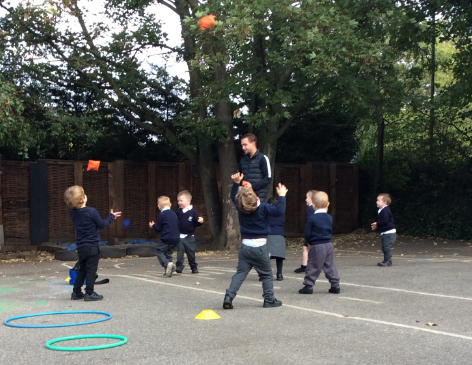
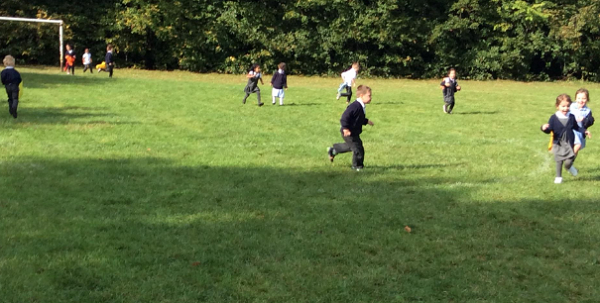
KS1 and 2
At St. Andrew’s we are committed to teaching two hours of PE each week across two hour-long lessons. One lesson each week is taught by a qualified coach and covers aspects of the National Curriculum through a focus on particular sports and the skills associated with them. The second hour focuses on skills that are transferrable across all sporting disciplines and is taught through the use of the Real PE scheme.
Real PE is organised around skills in two categories: multi-ability skills and physical skills. Multi-ability skills include applying physical skills, personal skills, social skills, cognitive skills, creative skills and knowledge and understanding of health and fitness. These are underpinned and supported by physical skills of co-ordination, balance and agility. Each lesson is organised into a warm-up, physical skills practice, skill application and a cool down, which is designed to become more challenging as the children move through the school.
Lessons led by our sports’ coach are centred on the children learning particular sports and the skills associated with them, while consolidating and applying what has been learnt through the Real PE scheme.
Pupils in KS1 are taught the fundamental skills required to participate in team games, such as ball skills, attacking, defending and shooting, and hitting, catching and running. They also use skills learnt in PE lessons to perform gymnastic and dance skills, creating simple sequences and movement patterns.
In KS2, children continue to develop these skills, learning how to combine and link them in different ways, and developing their communication and collaboration skills. Each year they learn various different sports, including basketball, football, gymnastics, hockey, cricket and rounders, and athletics. They also continue to develop their dance skills. Pupils in Year 5 attend Swimming lessons and pupils in Year 6 take part in outdoor and adventurous activities through the residential.
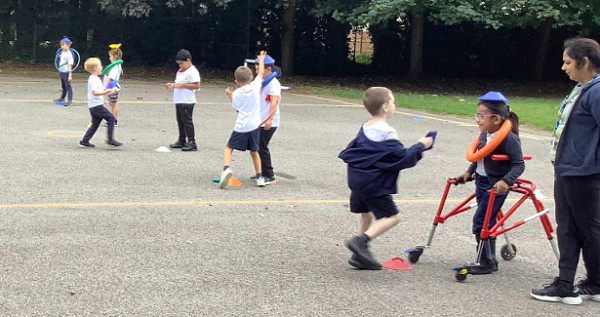
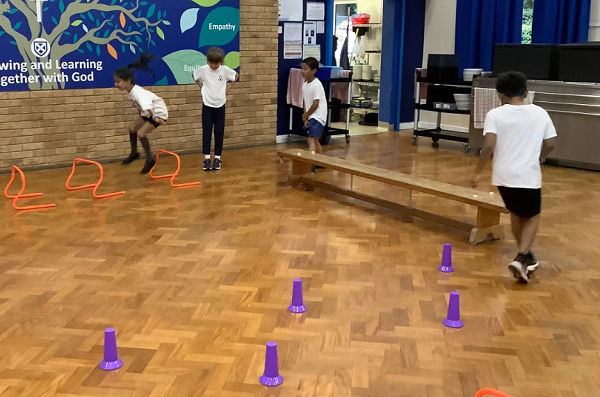
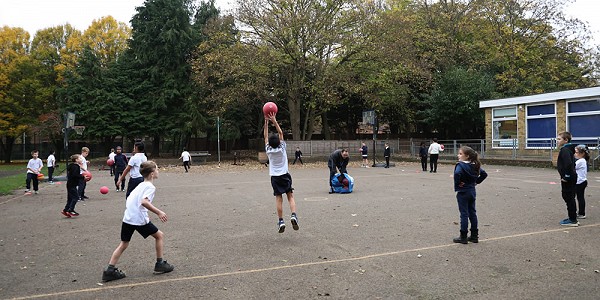
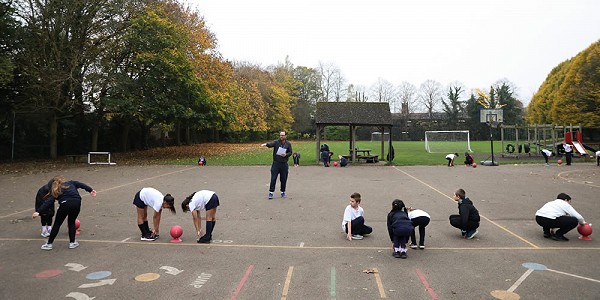
School Games
As School Games Mark Platinum Award holders, we have pledged a commitment to ensure that our pupils are given wider opportunities beyond the curriculum to take part in school sport and physical activity. In order to gain the award we are committed to demonstrate how we are doing the following:
- Maintaining and growing our school’s engagement and delivery of the Chief Medical Officer’s (CMO) 60 active minutes for every child or 20 minutes for SEND young people.
- Delivering and engaging in competitions that has clear intent and creates positive experiences based on the motivation, competence and confidence of our young people that need support the most.
- A clear focus on transition points and how secondary schools are engaging in the School Games.
- Supporting the personal development of targeted young people though youth engagement and leadership.
- Advocating and engaging key stakeholders on the value of the School Games to support local provision and improve the experiences for your young people and their families.
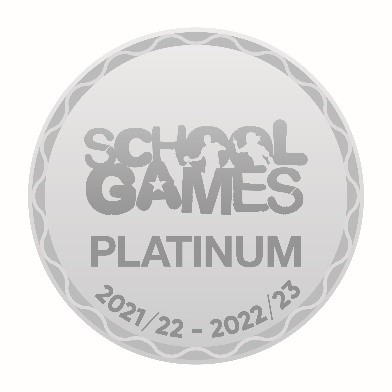
More information about how we have made improvements to PESSPA can be found HERE.
More information about extra-curricular clubs can be found HERE.
More information about additional sporting events can be found HERE.
Computing
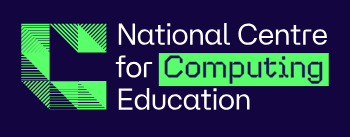
‘The Teach Computing Curriculum has been written to support all pupils. Each lesson is sequenced so that it builds on the learning from the previous lesson, and where appropriate, activities are scaffolded so that all pupils can succeed and thrive. Scaffolded activities provide pupils with extra resources, such as visual prompts, to reach the same learning goals as the rest of the class. Exploratory tasks foster a deeper understanding of a concept, encouraging pupils to apply their learning in different contexts and make connections with other learning experiences.’
EYFS
In Nursery and Reception, children learn through the world around them. They learn how to understand rules and routines, be confident to try new activities and show independence, resilience and perseverance in the face of challenge and develop their small motor skills so that they can use a range of tools competently, safely and confidently. They have access to an interactive white board, laptops and tablets within the classroom and learn to how to treat these with respect.
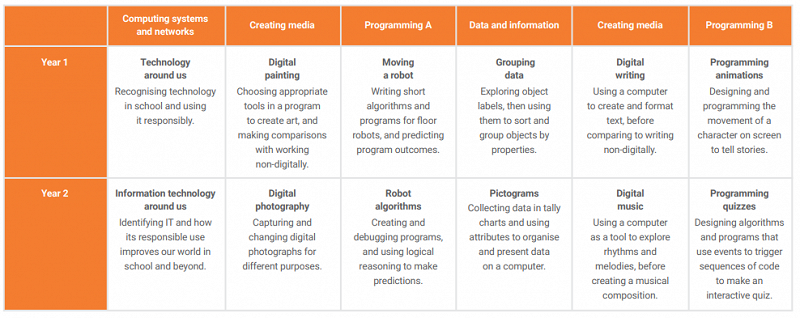
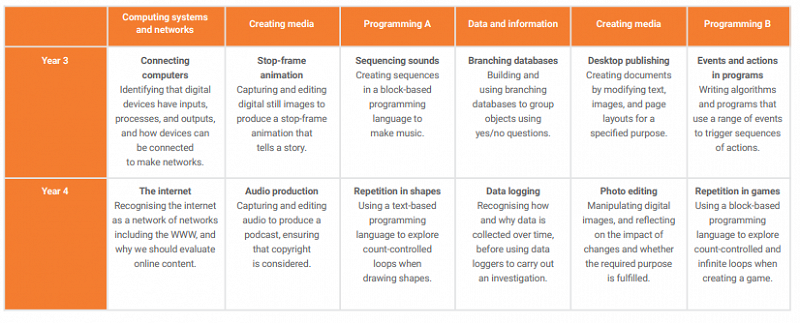
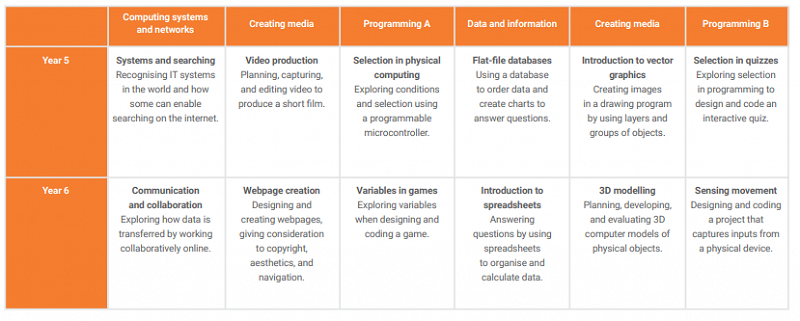
The units for key stages 1 and 2 are based on a spiral curriculum. This style of curriculum design reduces the amount of knowledge lost through forgetting, as topics are revisited yearly. It also ensures that connections are made even if different teachers are teaching the units within a theme in consecutive years. Each lesson is sequenced so that it builds on the learning from the previous lesson, and where appropriate, activities are scaffolded so that all pupils can succeed and thrive.
The Teach Computing Curriculum acknowledges that physical computing plays an important role in modern pedagogical approaches in computing, both as a tool to engage pupils and as a strategy to develop pupils’ understanding in more creative ways. Pupils use range of equipment including Bee Bots, laptops and tablets in KS1. In KS2, physical computing supports and engages a diverse range of pupils in tangible and challenging tasks using crumble controllers and micro bits, as well as laptops and tablets.
The children are encouraged to make links across the curriculum areas, for example in year 1 they create pictures based on an artist using a computer drawing on the knowledge they have gained in art and in year 3 they use their musical knowledge to block code musical sequences.

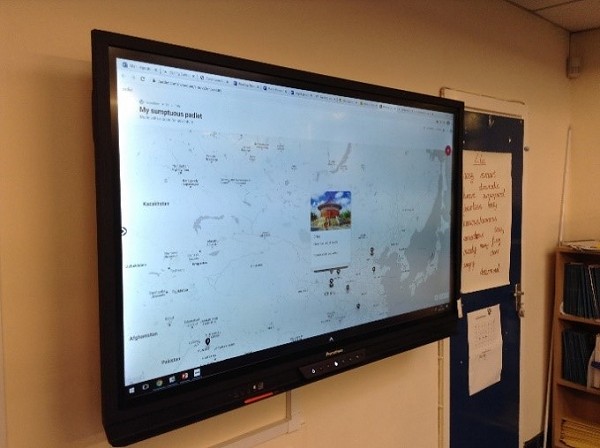
PSHE and RSE
The PSHE and RSE curriculum equips pupils with the knowledge, skills and attributes needed to keep themselves healthy and safe and to prepare them for life as active citizens in modern Britain. The PSHE curriculum focuses on three strands:
- Relationships
- Living in the Wider World
- Health and Wellbeing
PSHE lessons are taught weekly; however, a range of opportunities to develop and build upon PSHE themes are incorporated into every part of the curriculum and school day, such as: visitors delivering Collective Worship on a particular theme, Anti-Bullying and safety workshops.
RSE is delivered in the form of an RSE week in which all classes focus on topics suitable to their age within the statutory relationship and sex education elements from the PSHE relationship and science curriculums.
EYFS
Within the Foundation Stage (Nursery and Reception), the Early Years Foundation Stage Framework is followed. The ‘PSHE’ aspect of the curriculum is followed mainly through the area 'Personal, Social and Emotional Development' but also 'Communication and Language' and 'Understanding the World'. PSHE teaching is linked to the overall topics or themes of the half term.
Relationships
Pupils explore meaning full relationships with peers and adults. They begin to understand how others might be feeling and help to find solutions to conflicts and how to say no when they feel uncomfortable. Children see themselves as valued individuals and work and play cooperatively and take turns with others.
Living in the Wider World
Children learn to be confident to try new activities and show independence, resilience and perseverance in the face of challenge. They can explain the reasons for rules, know right from wrong and try to behave accordingly. With the help of adults they can talk about the lives of people around them and their roles in society.
Health and Wellbeing
Children learn with support to manage their own basic hygiene and personal needs from nursery onwards, including dressing, going to the toilet and understanding the importance of healthy food choices.
KS1
The journey through KS1 continues with building on the previous learning in EYFS, developing greater independence and taking responsibility for their own actions and voicing their needs.
Relationships
Children communicate their feelings to others, to recognise how others show feelings and how to respond. They can share their opinions on things that matter to them and explain their views through discussions with one other person and the whole class. Children are taught the importance of listening to other people and playing and working cooperatively (including strategies to resolve simple arguments through negotiation). Children know that people’s bodies and feelings can be hurt (including what makes them feel comfortable and uncomfortable). Through role play scenarios, they learn how to recognise when they or someone else feels lonely and what to do, and to understand what is kind and unkind behaviour and how this can affect others. They learn how to treat themselves and others with respect both in person and online and are taught about giving consent.
Living in the Wider World
Children learn that they belong to various groups and communities such as school and family. They understand that people and other living things have needs and that they have responsibilities to meet them (including being able to take turns, share and understand the need to return things that have been borrowed). Through role play and exploring children learn about the role money plays in their lives including how to manage their money, keep it safe, choices about spending money and what influences those choices.
Health and Wellbeing
Children will know what constitutes a healthy lifestyle including the benefits of physical activity, rest, healthy eating and dental health. They learn to recognise what they like and dislike, how to make real, informed choices that improve their physical and emotional health. Children understand that household products, including medicines, can be harmful if not used properly. Children are given the skills to know who to go to if they are worried or feel unsafe and understand what a trusted adult is. Through role play and exploring different scenarios, children begin to judge what kind of physical contact is acceptable, comfortable, unacceptable and uncomfortable and how to respond (including who to tell and how to tell them). Children are taught to know the difference between secrets and surprises and the importance of not keeping adults’ secrets, only surprises. Linking with RSE Week, children learn about growing and changing and new opportunities and responsibilities that increasing independence may bring. They also start to learn the names for the main parts of the body (including external genitalia) the similarities and differences between boys and girls. Linked in with this children explore the rules for and ways of keeping physically and emotionally safe (including safety online, the responsible use of ICT, the difference between secrets and surprises and understanding not to keep adults’ secrets; road safety, cycle safety and safety in the environment (including rail, water and fire safety) and what to do in an emergency.
KS2
In KS2 children build on their previous learning. Units are revisited; however, the content will explore topics in more depth and support children in their path to greater independence. Through debating, role play and given scenarios, children are given opportunities to explore ideas and decisions.
Relationships
Children start to look at different kinds of relationships, those of family, friends and romantic relationships, and how to ensure the relationship is healthy and balanced. Themes such as positive and negative behaviours are explored as well as strategies to ensure children have the tools to navigate the complexities arising in their relationships with others. Children learn to respect others and how to communicate effectively. Children are taught the importance of their right to say no if they feel uncomfortable and consent is a focus throughout RSE Week as well as PSHE lessons.
Living in the Wider World
In KS2, these unit explore the need to respect and care for the world around them. From communities, individual people, the environment and the wider world, children are taught to understand about respecting the differences and similarities between people and recognising what they have in common with others, (e.g. physically, in personality or background through learning about diversity: what it means; the benefits of living in a diverse community; about valuing diversity within communities). Children understand that everyone has human rights, all people and all societies, and that children have their own special rights set out in the United Nations Declaration of the Rights of the Child and that these universal rights are there to protect everyone and have primacy both over national law and family and community practices. Children explore ways of carrying out shared responsibilities for protecting the environment in school and at home; how everyday choices can affect the environment (e.g. reducing, reusing, recycling; food choices). They learn that there is a broad range of different jobs/careers that people can have and that people often have more than one career/type of job during their life. Children discuss what might influence people’s decisions about a job or career, (e.g. personal interests and values, family connections to certain trades or businesses, strengths and qualities, ways in which stereotypical assumptions can deter people from aspiring to certain jobs). This enables them to think some of the skills that will help them in their future careers, (e.g. teamwork, communication and negotiation).
Health and Wellbeing
These units focus on the physical, mental and social wellbeing and how to ensure that a healthy balance is found to support the development of a balanced lifestyle. Children explore making informed choices (including recognising that choices can have positive, neutral and negative consequences) and to begin to understand the concept of a ‘balanced lifestyle’. Through the unit children will learn about healthy eating, exercise, safety, drugs and substances, mental wellbeing and the changes during puberty. Some aspects of this unit will be taught during RSE Week such as puberty. Children will explore what peer pressure can do to decision making and they are taught strategies to support them in making the correct choices for themselves.
